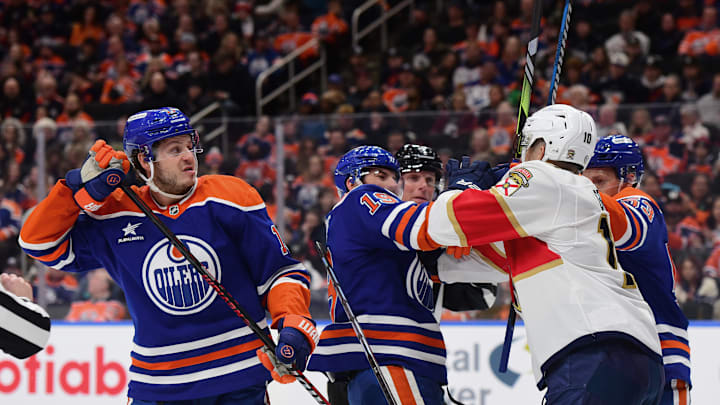Let's not pretend the Florida Panthers are doing anything quietly anymore. Saturday night in Edmonton wasn't just a bounce-back win after their Game 4 collapse. It was a full-blown, chest-out, jaws-locked statement. They walked into Rogers Place in Game 5 of the Stanley Cup Final, shut the door on the Oilers' speed, outclassed their goaltending, and put themselves one win away from going back-to-back as champs with a 5-2 thumping. Yes, Brad Marchand, the 37-year-old agent of chaos, lit the fuse. At 3:11 into the game, Marchand found a loose puck near the faceoff dot, zoomed through the defense, and snapped a high glove-side shot past Calvin Pickard. That's goal No. 1 for the Panthers and goal No. 1 of the night for the NHL's most annoying — and most clutch — pest.
This goal is the definition of Brad Marchand's Hall of Fame career:
— BucciOT.Com (@Buccigross) June 15, 2025
1) Anticipation. (Faceoff ready)
2) Hockey sense coupled with determination. On your toes.
3) he's an elite puck protector (boxes out Elkholm). He always VALUES the puck.
4) Professional, fit hands. His strength… pic.twitter.com/CcV5RSixFD
Pickard looked sharp early, but that goal exposed his glove positioning and choice of a blocking butterfly over a reactive one. What made it more interesting? On the other side, Sergei Bobrovsky made a brilliant glove save on Connor Brown's breakaway minutes later — two different glove techniques, same period, two very different outcomes. Late in the opening frame, Sam Bennett made it 2–0 as a blocked shot from Matthew Tkachuk kicked right to Bennett, who buried the rebound for the pending unrestricted free agent's15th of the playoffs. In the third, Marchand struck again, taking a beautiful chip pass from Luostarinen, curling around Jake Walman, and roofing a backhand to make it 3-0. He now has six goals in this Cup Final alone, becoming the first player in NHL history to score 5+ goals in two separate Finals for two different teams (2011 Bruins, 2025 Panthers). He's 37, and he's doing this.
Brad Marchand's goal was so filthy, this Oilers' fan had to switch teams 😭🤣 pic.twitter.com/rOrgPLIlr7
— Bleacher Report (@BleacherReport) June 15, 2025
Connor McDavid finally got on the board with his first of the series, using his pass-first reputation to freeze Bobrovsky with a fake before sliding it through. It was a perfect mix of creativity and deception. Yet it was too late.
Fewest games to 150 career playoff points
— Sportsnet Stats (@SNstats) June 15, 2025
Wayne Gretzky 68
Mario Lemieux 86
Connor McDavid 95 pic.twitter.com/GpNTE21XyK
Just minutes later, Sam Reinhart sniped through a Barkov setup and a screen to make it 4–1. You could feel Rogers Place deflate. Florida owned the middle of the ice. The Oilers went with Calvin Pickard after Stuart Skinner's rocky starts earlier in the series. It didn't work. Pickard wasn't terrible, but he didn't make the saves Florida forced him to make. On the Reinhart goal, he was slow to come out and play the puck, and that led to Florida gaining possession, setting up, and silencing the building. It's safe to say we'll see Skinner again in Game 6.
Who do the Oilers start in game 6? pic.twitter.com/R6dtld1OPX
— Empty Netters (@EmptyNettersPod) June 15, 2025
Florida was suffocating in the third. Every time Edmonton tried to build momentum, it was erased. Bobrovsky stood tall when he needed to, and the Panthers' structure — their defensive buy-in proved unmatched. You can draw a direct line from GM Bill Zito's controversial decision to bring in Paul Maurice in 2022 to nights like this. People questioned it at the time. The team had just won the Presidents' Trophy. Yet Zito didn't want structure, toughness, and winning hockey. Saturday night proved the reigning champions right again. Corey Perry made it 4–2 with 3:13 to play, one-timing a puck from the point past Bobrovsky. However, the building barely had time to breathe before Eetu Luostarinen buried the empty netter to seal it, 5–2. One was caught on camera wearing a Panthers jersey by the third period.
This fan switched from an Oilers jersey to a Panthers jersey after watching Brad Marchand score his second goal of the game. 😔
— theScore (@theScore) June 15, 2025
(🎥: @Sportsnet)pic.twitter.com/oXjvqIhw2u https://t.co/VvnLdfyuq7
The Panthers can close out the series in Game 6 on Tuesday at home. They've now tied the NHL record with 10 road wins in a single playoff run and lead the postseason in both goals scored (4.05 per game) and goals against (2.50). They're disciplined, deep, battle-tested, and posses Marchand who's aging like playoff wine. Florida has been through everything, and they never blink. If Edmonton somehow wins Game 6? Don't expect the Cats to panic. They can almost taste the repeat champagne. One of the clearest lessons from Game 5 is Florida doesn't chase the game. They trust the process. They play the same way, whether they're up 3–0 or coming off a blown lead like they were in Game 4. That's built on culture; coaching, leadership, and trust in the system. The Rangers too often get caught in the mood swings of playoff hockey. They panic after a bad bounce or after a power-play goal, and this year, they went back to trying to go end-to-end. That reactive style is precisely what playoff-tested teams exploit. Florida has built habits, and when things get tight, they lean on those strengths. If the Blueshirts want to win in June, they have to stop playing like a team chasing validation and start playing like one chasing structure.
